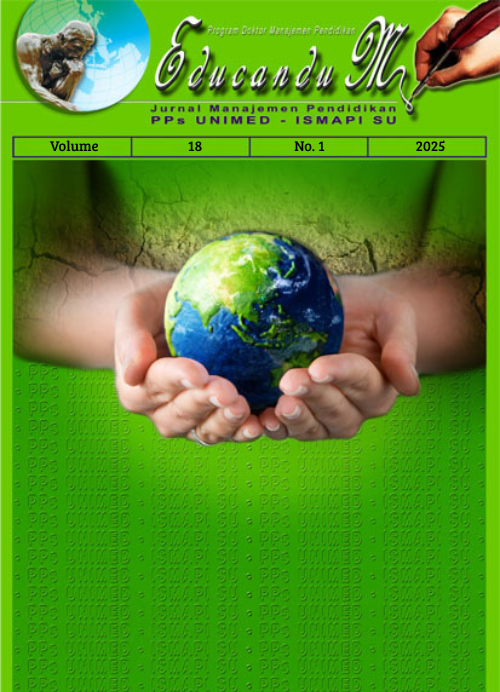Analisis Literatur Tentang Efektivitas Deep Learning Dalam Meningkatkan Hasil Belajar Matematika Siswa SD
Abstract
Mathematics learning in elementary schools plays an important role in developing students' critical thinking skills, conceptual understanding, and problem-solving skills. The deep learning approach emerges as an effective solution in facing increasingly complex learning challenges and diverse student needs. Thus, this study aims to analyze the evidence of the effectiveness of deep learning in improving elementary school students' mathematics learning outcomes. This study uses a literature review method with four stages carried out, namely: designing a review, conducting a review, analyzing data, writing, and compiling the results of the review. The data obtained in this study are based on selected articles. Based on a review of ten recent research articles, it was found that the deep learning approach is able to increase cognitive engagement, deep conceptual understanding, and metacognitive and emotional aspects of students. This approach is also supported by the use of contextual, interactive learning strategies, and digital technology that are relevant to students' daily lives. The results of the review show that the application of deep learning not only improves academic achievement, but also helps shape character and develop students' potential as a whole. Therefore, the deep learning learning strategy deserves to be the main choice in improving the quality of mathematics learning in elementary schools.References
Arifin, Z., & Sari, D. P. (2023). Pengaruh Pendekatan Deep Learning terhadap Kemampuan Berpikir Kritis Siswa Sekolah Dasar. Jurnal Pendidikan Matematika, 15(2), 123-134.
Asmi, Y. K., & Wijayanto, Z. (2024). Pengaruh Pendekatan Deep Learning dan Media Interaktif Berbasis Platform Digital Canva terhadap Hasil Belajar Pengukuran Luas di Sekolah Dasar. Didaktika Dwija Indria (Prosiding Journal of Physics: Conference Series), 13(2), 116–121.
Aryanto, S., Meliyanti, Amelia, D., Maharbid, D. A., Gumala, Y., & Gildore, P. J. E. (2025). Pembelajaran Literasi dan Numerasi melalui Deep Learning: Pendekatan Transformasional di Sekolah Dasar. Journal of Professional Elementary Education (JPEE), 4(1), 49–56.
Barokah, N., & Mahmudah, U. (2025). Transformasi Pembelajaran Matematika SD melalui Deep Learning: Strategi untuk Meningkatkan Motivasi dan Prestasi. BILANGAN: Jurnal Ilmiah Matematika Kebumian dan Angkasa, 3(3), 48-61.
Budiman, R., & Hartono, S. (2024). Implementasi Pendidikan Matematika Realistik (PMRI) dalam Meningkatkan Pemahaman Konsep Matematika. Jurnal Ilmiah Pendidikan Dasar, 10(1), 45-58.
Fitriani, A., & Santiani. (2025). Analisis Literatur: Pendekatan Pembelajaran Deep Learning dalam Pendidikan. Jurnal Ilmiah Nusantara (JINU), 2(3), 50–57.
Hayati, R. (2025). Peran Deep Learning dalam Meningkatkan Keterampilan Pemecahan Masalah Siswa. Jurnal Pendidik Indonesia, 6(1), 29-38.
Mutmainnah, N., Adrias, & Zulkarnaini, A. P. (2025). Implementasi Pendekatan Deep Learning terhadap Pembelajaran Matematika di Sekolah Dasar. Pendas: Jurnal Ilmiah Pendidikan Dasar, 10(1), 858-871.
Natsir, S. R. (2025). Implementasi Kurikulum Merdeka dalam Pembelajaran Matematika di Sekolah Dasar: Studi Deskriptif Pendekatan Deep Learning dalam Kerangka Kurikulum Merdeka Belajar. Journal of Innovation Research and Knowledge (JIRK), 4(9), 7263-7273.
Rahayu, C., Setiani, W. R., Yulindra, D., & Luthfia. (2025). Pendidikan Matematika Realistik Indonesia dalam Pembelajaran Mendalam (Deep Learning): Tinjauan Literatur. Jurnal Pendidikan Matematika Universitas Lampung, 13(1), 9–25.
Wijaya, A. A., Haryati, T., & Wuryandini, E. (2025). Implementasi Pendekatan Deep Learning dalam Peningkatan Kualitas Pembelajaran di SDN 1 Wulung Randublatung, Blora. Research Journal on Education, 5(1), 451-457.
Wulansari, A., & Arta, D. J. (2025). Implementasi Deep Learning: Suatu Inovasi Pendidikan. Jurnal Wawasan Pengembangan Pendidikan, 13(1).
Published
How to Cite
Issue
Section
License
Copyright (c) 2025 EducanduM

This work is licensed under a Creative Commons Attribution-NonCommercial-ShareAlike 4.0 International License.










